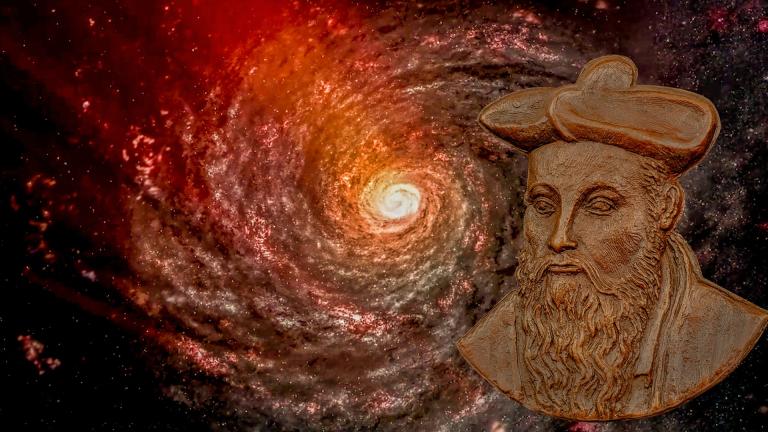
Read more about Mysteries

If there’s one constant about Nostradamus, it’s that he never quite leaves the conversation. Every year, fresh prophecies are dusted off and repackaged for the calendar ahead. 2025 was no exception. So what do his verses have to say about 2026?
Short answer: Nostradamus never dated 2026 explicitly.
Long answer: 2026 does offer a few tempting hooks. Most notably a headline-grabbing total solar eclipse over parts of Europe, the first in 27 years. It’s given devotees of the French astrologer and apothecary plenty of ammunition when it comes to tethering certain quatrains to the year.
Join us at Sky HISTORY and let’s take a look at what might (or might not) unfold in 2026:
Seven months great war, people dead through evil
Rouen, Evreux the King will not fail.
This one seems to resurface whenever war looms in Europe. Given the current tensions between Russia and Ukraine, enthusiasts have spotlighted it as ominously topical. The text itself contains no '2026' and the place names (Rouen and Évreux) are rooted in 16th century French geography. That hasn’t stopped interpreters from seeing 2026 as a year that fits this passage.
Some claim Nostradamus has predicted war in the past, with lines like 'Within two cities, there will be scourges the like of which was never seen' linked to the attacks on the Japanese cities of Hiroshima and Nagasaki, which were devastated by atomic bombs at the end of World War Two.
Another way believers argue for 2026 is numerology: quatrains numbered '26' must relate to the year 2026, right? It’s tidy but not textual. Still, here are a couple of '26' verses you might see enlisted:
I:26 (Leoni translation): 'The great swarm of bees will arise… by night the ambush…'
Readers sometimes connect bees to political symbolism (Napoleon famously adopted the bee as an imperial emblem centuries after Nostradamus), then spiral off into modern analogies. Could this mean high-profile (and highly controversial) political figures like Donald Trump and Vladimir Putin could have some big wins in 2026?
It wouldn’t be the first time a soothsayer has made a Trump-based prediction, with Ingersoll Lockwood’s 19th century novels recently causing quite the stir online.
II:26 (standard French/English text): 'Because of the favour that the city will show… the Ticino will overflow with blood…'
Again, there’s no year attached, but the canton of Ticino (tucked away in the southernmost region of Switzerland) may want to watch its back in 2026.
The upcoming total solar eclipse across parts of Europe in 2026 has prompted enthusiastic readers to comb the prophecies for lines about darkened suns or 'celestial fire'. Nostradamus does feature occasional sky-inspired drama (think moons 'obscured', planets 'in retrogression' and fires from the sky) but these are generic celestial motifs, common in Renaissance astrology and not pinned to specific future years.
Professional reference works and sceptics alike point out that Nostradamus wrote in Middle French and used obscure Latin words, with deliberately hazy phrasing. Multiple competing manuscripts, inconsistent spellings and creative make it easy to retrofit a verse to yesterday’s headline. Or in this case, next year’s anxieties. This means the same quatrain can be made to “foretell” wildly different events, depending on the translation chosen and the liberties taken.
Charlatan or genius? That’s up to the reader.
If Nostradamus is so wishy-washy, why do we keep turning back to his predictions? Historians say it’s all about the era. Like the 21st century, Nostradamus lived in a time defined by social divisions and political uncertainty. The invention of the printing press also made it easier than ever to transmit ideas to the masses. Basically, the 16th century equivalent of social media.
Much of the hype can be explained away by a modern term known as confirmation bias - assigning meaning to a prediction after an event has already happened. When you look at it this way, many Nostradamus predictions have come true. Like the Great Fire of London in 1666. It’s a technique long favoured by fans of fellow soothsayers like Baba Vanga.
Nostradamus predictions are fun but for the most part, we’re all about facts. Subscribe to the Sky HISTORY newsletter for carefully sourced features, expert insights and engaging shows and more, delivered to your inbox.